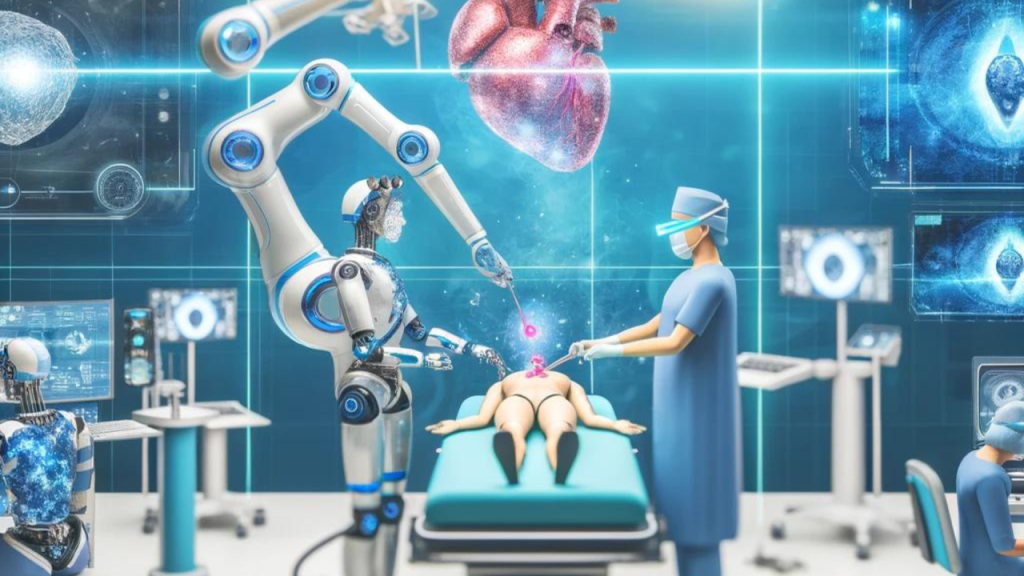Artificial intelligence (AI) in healthcare refers to the use of advanced algorithms and machine learning techniques to analyze complex medical data, assist healthcare professionals in diagnosis and treatment decision-making, and improve patient outcomes. AI applications in healthcare encompass a wide range of areas, including medical imaging, predictive analytics, personalized medicine, and virtual health assistants.
Key Components of AI in Healthcare
-
Machine Learning Algorithms: Algorithms that enable computers to learn from data and make predictions or decisions without explicit programming.
-
Natural Language Processing (NLP): Techniques for processing and analyzing human language, enabling computers to understand and generate text-based data such as medical records and clinical notes.
-
Computer Vision: Technology that enables computers to interpret and analyze visual information, such as medical images and videos, to aid in diagnosis and treatment planning.
Transformative Applications of AI in Healthcare
Medical Imaging and Diagnostics
AI has revolutionized medical imaging by enhancing the accuracy and efficiency of diagnosis across various modalities, including radiology, pathology, and dermatology. AI-powered image analysis algorithms can assist radiologists and pathologists in detecting abnormalities, identifying patterns, and making more accurate diagnoses.
Predictive Analytics and Risk Stratification
AI algorithms can analyze large volumes of situstoto patient data, including electronic health records (EHRs), genomic data, and physiological signals, to identify patterns, predict disease progression, and stratify patient risk. Predictive analytics enables healthcare providers to proactively intervene, personalize treatment plans, and improve outcomes for high-risk patients.
Personalized Medicine and Treatment Optimization
By analyzing individual patient data, including genetic factors, medical history, and lifestyle factors, AI algorithms can tailor treatment plans and interventions to each patient’s unique needs and characteristics. Personalized medicine approaches enable more targeted and effective therapies, minimize adverse effects, and optimize patient outcomes.
Opportunities and Challenges
Opportunities for Enhanced Efficiency and Quality of Care
AI has the potential to streamline healthcare workflows, reduce administrative burden, and improve clinical decision-making, leading to more efficient and cost-effective healthcare delivery. By automating routine tasks, identifying treatment options, and providing decision support, AI empowers healthcare professionals to focus on patient care and outcomes.
Addressing Healthcare Disparities and Access
AI technologies hold promise for addressing healthcare disparities and improving access to care, particularly in underserved communities. Telemedicine platforms, virtual health assistants, and AI-driven diagnostics can extend the reach of healthcare services, overcome geographical barriers, and facilitate remote monitoring and consultation.
Ethical and Regulatory Considerations
As AI becomes more integrated into healthcare delivery, ethical and regulatory considerations become increasingly important. Issues such as patient privacy, data security, algorithm bias, and accountability require careful attention to ensure that AI technologies are deployed responsibly and ethically, with a focus on patient safety and well-being.
Conclusion
Artificial intelligence is poised to transform the landscape of healthcare by revolutionizing patient care and diagnosis. With its ability to analyze vast amounts of data, identify patterns, and assist healthcare professionals in decision-making, AI holds the promise of improving outcomes, enhancing efficiency, and advancing personalized medicine. However, realizing the full potential of AI in healthcare requires addressing challenges such as data privacy, algorithm bias, and regulatory compliance while ensuring that patient safety and ethical considerations remain paramount. By navigating these challenges with diligence, collaboration, and innovation, the integration of AI into healthcare has the potential to revolutionize patient care and drive positive outcomes for individuals and communities alike.

